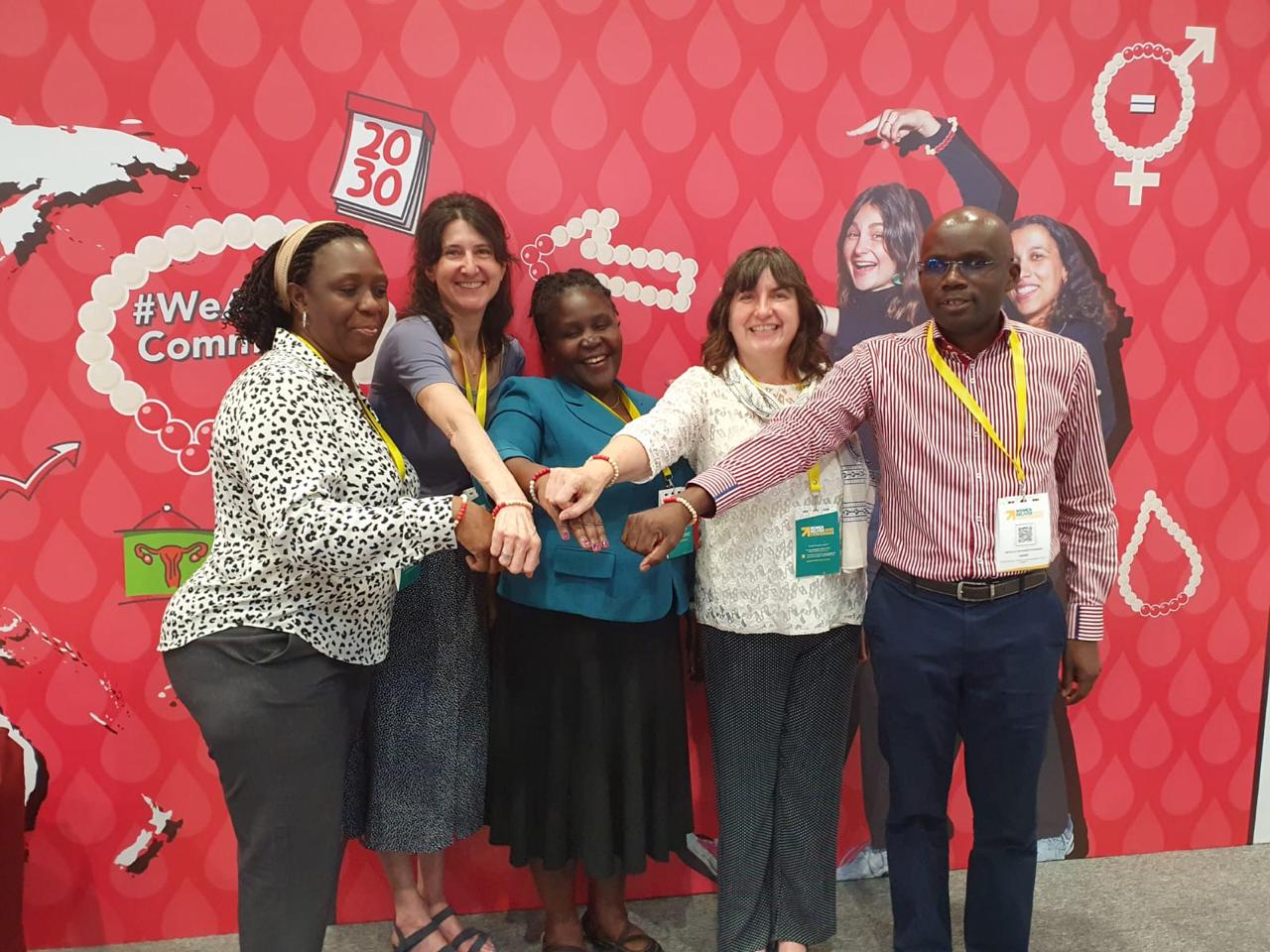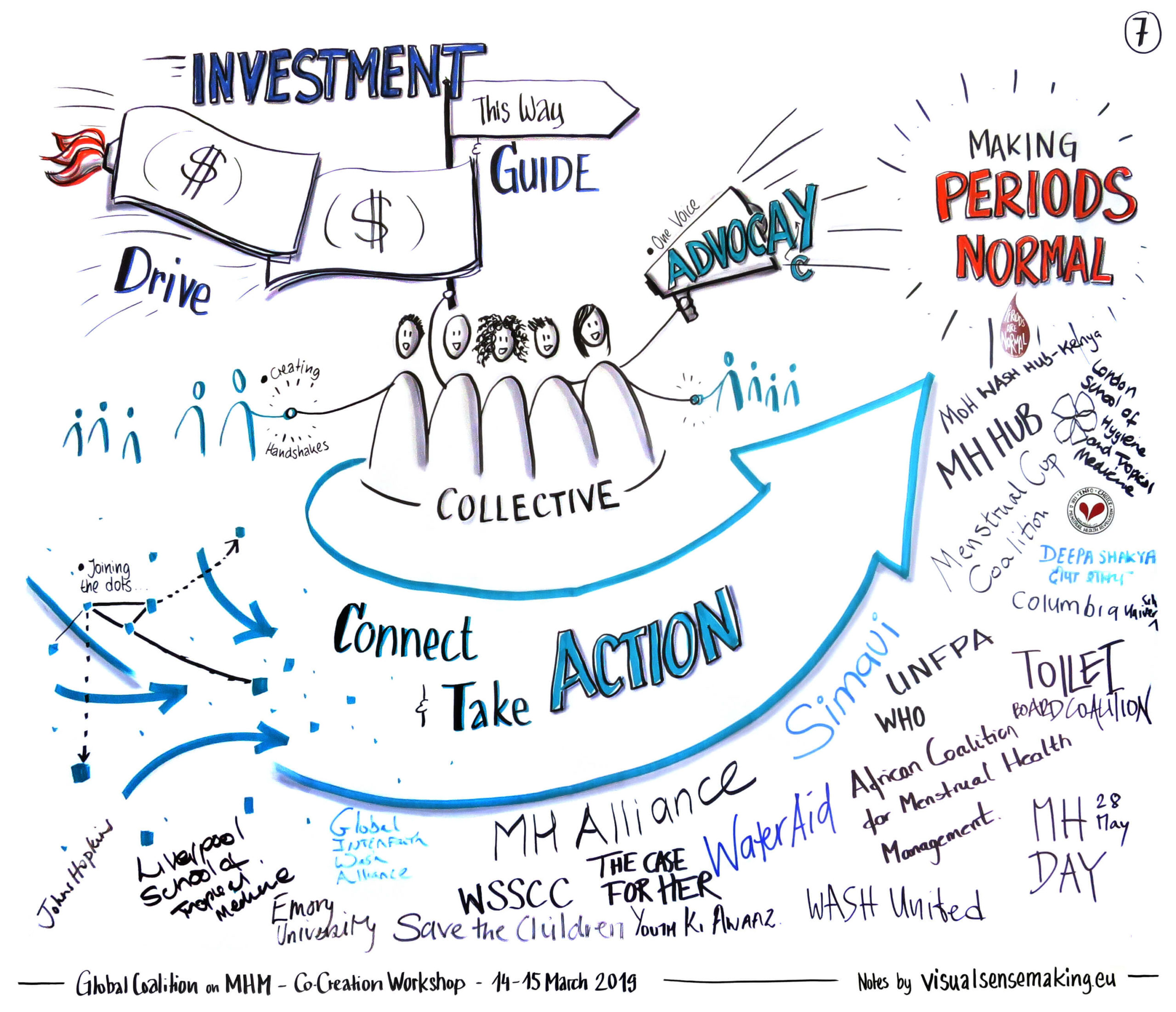The GMC is a collective of international non-governmental organizations, UN agencies, international research institutes, academicians and agencies, existing global, regional and country networks and coalitions, mutlinational social enterprises, select private sector actors, and organizations that catalyze investments in women’s health.
In September 2018, the Water Supply and Sanitation Collaborative Council (WSSCC) proposed to co-establish with WaterAid, a global coalition for menstrual health and hygiene (MHH). The aim was to connect interests, commitments and expertise to scale-up evidence-based MHH programming.
A group of stakeholders from across sectors engaged in menstrual health and hygiene met in Geneva in March 2019, convened by WSSCC, to explore the case for establishing a global coalition for menstrual health and hygiene. This was based on the premise that the strengths of diverse organizations could serve to amplify efforts and reduce duplication for mainstreaming MHH across health, education, gender, WASH and partnership SDGs.
The meeting concluded that there is a unanimous call for a global collective to connect Menstrual Health actors to strengthen our work. The lack of sufficient and evidence-based investment was identified as the biggest obstacle in accelerating progress and achieving results. The group concluded that focusing on evidence and advocacy to drive and guide improved investment in menstrual health and hygiene is a mutually beneficial starting point for a new Global Menstrual Collective. The illustration below was captured at the meeting to show what the group wanted to the Collective to be.
The GMC membership comes together to use their collective strength to inform, guide and increase investments toward menstrual health and hygiene for all. We are not creating a new global fund, or directly channeling investments. We have come together to use our collective strength to increase and guide investments toward menstrual health and hygiene at all levels.

We drive, guide, and promote investments in and actions for menstrual health and hygiene through evidence-based advocacy.
GMC Members work together to:
Action Groups (also known as Working or Task Groups) drive GMC’s mission. These self-governing groups comprise GMC members who come together to work on evidence generation, advocacy issues and opportunities, a deep dive into a thematic area, or collective building. Action groups may be long-term groups or short-term groups that come together for a particular event or advocacy opportunity.
GMC Action Groups include:
Not all groups may be active every year. For more information, please contact The Coordination Team
The Coordination Team is responsible for carrying out a programme of work in line with the stated aims of the Collective. The team is in charge of the day-to-day activities of the GMC, member coordination, and provided support to Action Groups. This team reports to the Core Group.
The Coordination team currently comprises of the GMC Coordinator.
The GMC Core Group comprises representatives of GMC’s member base who are representative of the larger stakeholder base. Core group members serve a two-year term, for a maximum two terms at a stretch (total of four years).
The purpose of the Core Group is to enable the GMC to achieve its goals as effectively as possible, by leading, supporting and steering the collaborative efforts of the GMC. The Core Group oversees:
– Development of, and respect for, GMC’s values and principles
– Strategic planning and approval of plans and budgets for implementation
– Resource mobilization and prudent utilisation of financial and human resources to achieve strategic plans
– Mobilisation of the wider membership of the collective to advance strategic goals and objectives
– Liaison with the Host Organisation (currently WaterAid) to ensure compliance with policies, procedures and regulatory requirements
– The Core Group is accountable to the wider membership of the GMC in delivering this purpose
Current Core Group members:

In September 2018, WSSCC proposed to co-establish with WaterAid, a global coalition for menstrual health and hygiene (MHH). The aim was to connect interests, commitments and expertise to scale-up evidence-based MHH programming.
A group of stakeholders from across sectors engaged in menstrual health and hygiene met in Geneva in March 2019, convened by WSSCC, to explore the case for establishing a global coalition for menstrual health and hygiene. This was based on the premise that the strengths of diverse organizations could serve to amplify efforts and reduce duplication for mainstreaming MHH across health, education, gender, WASH and partnership SDGs.
The meeting concluded that there is a unanimous call for a global collective to connect Menstrual Health actors to strengthen our work. The lack of sufficient and evidence-based investment was identified as the biggest obstacle in accelerating progress and achieving results. The group concluded that focusing on evidence and advocacy to drive and guide improved investment in menstrual health and hygiene is a mutually beneficial starting point for a new Global Menstrual Collective. The illustration below was captured at the meeting to show what the group wanted to the Collective to be.
